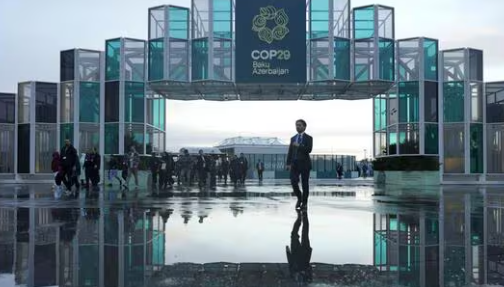The 29th Conference of the Parties (COP29) to the United Nations Framework Convention on Climate Change (UNFCCC) kicked off in Baku, Azerbaijan, on November 15, 2024, marking a historic moment in the global fight against climate change. As the world faces mounting environmental challenges, India has used the platform to call for urgent and decisive action, urging global leaders to mobilize $1.3 trillion annually to address the climate crisis and meet the ambitious goals set by the Paris Agreement.
India’s Minister of Environment, Forest, and Climate Change, Bhupender Yadav, in his address to the COP29 plenary session, highlighted the urgent need for enhanced financial commitments from both developed and developing nations. He emphasized that the world’s ability to mitigate the worst effects of climate change hinges on an annual investment of $1.3 trillion, which is essential to fund the transition to a low-carbon economy, implement adaptation measures, and support vulnerable countries facing the brunt of climate impacts.
The Call for Climate Finance
India has long been an advocate for climate justice, calling for equitable financial support for developing countries that are disproportionately affected by climate change despite contributing the least to global emissions. The country’s call for $1.3 trillion annually is based on the recognition that both mitigation and adaptation efforts require massive financial resources. These funds would not only support the implementation of renewable energy projects and climate resilience initiatives but also aid developing countries in building the necessary infrastructure to cope with climate-related challenges such as flooding, droughts, and extreme weather events.
“We cannot afford to delay action. The financial resources needed to address climate change are vast, and the time to act is now,” Yadav stated. “The climate crisis is global, but the impacts are felt locally. Developed nations must honor their financial commitments and provide the necessary support to help the most vulnerable nations adapt and thrive.”
Historic Significance of COP29
The COP29 meeting in Baku is seen as a critical juncture for the global community as it represents a turning point in addressing the climate crisis. With the 2030 deadline for achieving the Sustainable Development Goals (SDGs) rapidly approaching, COP29 serves as a crucial platform for scaling up efforts toward carbon neutrality and climate resilience. As one of the largest gatherings of world leaders, scientists, and environmental advocates, the conference provides an opportunity to assess progress made since COP26 in Glasgow and COP27 in Sharm El-Sheikh.
While discussions on financing climate action are expected to take center stage, other key issues will also be addressed, including the need for more ambitious emission reduction targets, the role of technological innovation in combating climate change, and the integration of climate policies with global economic development plans.
India’s Role and Vision
India’s leadership on climate issues is particularly significant, as the country represents a growing global economic power with a vast population and diverse geographical challenges. As the third-largest emitter of greenhouse gases in the world, India has a critical role to play in shaping global climate policy. At the same time, it has committed to ambitious national climate targets, including reaching net-zero emissions by 2070.
The Indian government has also pledged to increase its renewable energy capacity, promote green technologies, and enhance sustainable development initiatives. India’s emphasis on equity in climate finance is expected to be a central theme in discussions at COP29, as it seeks to ensure that financial mechanisms are both fair and accessible to all countries, particularly those in the Global South.
Looking Ahead: A Collaborative Path Forward
As the COP29 conference unfolds, the world looks toward Baku for a renewed commitment to combating climate change. The need for collaboration between governments, businesses, and civil society is more critical than ever. India’s call for the mobilization of $1.3 trillion annually serves as a reminder that addressing climate change requires not only political will but also financial commitment at an unprecedented scale.
With a comprehensive approach to financing and action, COP29 has the potential to become a landmark moment in the fight against climate change—one that could change the trajectory of global climate efforts and provide a sustainable future for generations to come.
The outcome of the conference will be closely watched by stakeholders across the globe, as the world looks to Baku to set the tone for the next phase of global climate action.








 India
India












